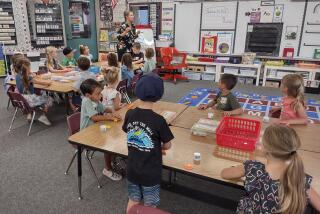An Age-Old Question: When to Begin Kindergarten?
- Share via
Gov. Pete Wilson has included in his proposed budget a plan to change a kindergarten admission requirement so that children must be 5 by Sept. 1, rather than by the current Dec. 1 deadline.
That means that about 25% of the children who would ordinarily begin kindergarten in the next month or two might have to wait until next year.
It all brings to mind a question in educational philosophy: Does waiting a year make a difference in a child’s ability to learn or in her future academic career?
Predictably, there are respected experts on both sides, each with some plausible arguments.
Some experts say children should enter school as soon as possible, based on the premise that every bit of learning and preparation for first grade helps.
“They need the social and developmental part of kindergarten, and the educational preparation: getting ready for reading, writing, and speaking,” said Vera Jashni, an assistant superintendent of the Culver City Unified School District.
It is even more crucial now, Jashni added, because more parents work and have less time to provide educational activities at home.
In addition, children who miss the cutoff date may have some self-esteem and motivation problems, according to Susan Golant, author of “The Joys and Challenges of Raising a Gifted Child.”
“When children are held back, they tend to be too old for the grade,” she said. “They end up feeling bored in school and, in the long run, they may drop out of school before they finish high school.”
Children who may need a special-education program--because of physical, emotional or learning disabilities--especially need to begin kindergarten early, Jashni said. If detected early enough, their problems may be lessened to a degree that makes special education unnecessary.
Some advocates for intellectually gifted children also reject the plan to make some children wait for kindergarten.
Keeping gifted children from school for an extra year “would definitely hurt them tremendously,” Golant warned.
“Gifted children have tremendous curiosity and desire to learn, and you don’t want to stifle that. They may end up not using their natural gifts.”
But Jashni disagrees that gifted children would be particularly harmed. “Usually, kids who are intellectually gifted are going to grow in spite of (the delay),” she said. “Many times they get sufficiently motivated once they get in (school) so that they’ll gallop along.”
On the flip side, some educators see problems among children who begin kindergarten at 4 rather than 5.
Younger children have less developed eye-hand coordination, weaker motor skills, shorter attention spans and insufficient overall maturation, said Maureen DiMarco, secretary of child development and education for Wilson.
In addition, “children who are of those younger months in kindergarten tend to have a much higher rate of failing a grade,” DiMarco said.
“They are much more likely to be diagnosed as learning disabled and to require special placement, and they are much more likely to flunk kindergarten.”
“When I see a child who’s having a lot of difficulties . . . quite often this is a younger child,” said Marjorie Hanson, a 23-year teacher at Cabrillo Elementary School in Malibu.
She especially notices younger children “not being able to interact socially and needing a lot more individual attention.”
Incidentally, such problems are especially common among boys, because they typically mature more slowly than girls (don’t worry--they catch up somewhere between ages 8 and 10). As a result, they often are held back a year.
At the same time, older kindergartners are more “able to stay on task, and to listen more attentively . . . they’re less fearful of separation from the parent,” Hanson said.
In fact, Hanson praises a common tradition in many European countries: starting school as late as 6 or 7.
“They’ve been ahead of us, and I think that what they do is very valid,” Hanson said.
“A child who is given the time to do things and develop in just a natural way is, to me, better (able to) cope with a school situation.”
But Golant disagrees that waiting longer for school makes children more prepared.
“There is a critical moment when you’re supposed to teach certain things, and those critical moments can be lost and never regained,” she said. “You’re denying kids an opportunity when you deny them school.”
More to Read
Sign up for Essential California
The most important California stories and recommendations in your inbox every morning.
You may occasionally receive promotional content from the Los Angeles Times.













